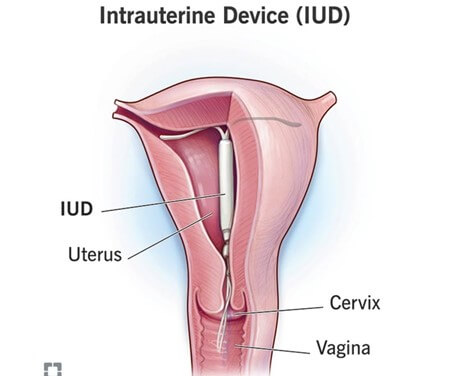Intrauterine Methods
A. Intrauterine Device (IUD)
The Intrauterine Device (IUD) releases a chemical that damages sperm, making it one of the most effective Long-Acting Reversible Contraceptive (LARC) methods along with the implant.
It is used by nulliparous and multiparous females and should be monitored monthly after menstruation to check placement.

Consent is required, and a pregnancy test, Pap smear, and cervical culture should be negative before usage.
IUD Types There are two types of IUDs: the 3-5 year hormonal IUD (which can decrease menstrual pain and heavy bleeding but may cause spotting, irregular bleeding, headaches, nausea, depression, and breast tenderness) and the 10-year copper IUD (which contains no hormones and is therefore safe for patients cautioned against hormonal birth control methods but may increase menstrual pain and bleeding).
Contraception can be reversed with immediate return to fertility, and it does not interfere with spontaneity.
It is important to report late or abnormal spotting/bleeding, tummy pain during sex, abnormal/foul-smelling vaginal discharge, fever, chills, change in string length, or questioned location.
Usage Recommendations IUDs are best used by clients in monogamous relationships to decrease the risk of sexually transmitted infections.
However, they can cause irregular menstrual bleeding and increase the risk of bacterial vaginosis, pelvic inflammatory disease (PID), uterine perforation, and uterine expulsion.
If pregnancy occurs, the IUD must be removed.
IUDs are contraindicated in patients with an active pelvic infection, abnormal uterine bleeding, or severe uterine distortion.
Nursing Test Bank
Naxlex Comprehensive Predictor Exams
Questions on Intrauterine Methods
Search Here
Related Topics
More on Nursing
- Newborn Complications
- Physiological And Physical Changes In Pregnancy
- Prenatal Diagnostic Tests And Procedures
- Pre-eclampsia, Eclampsia
- Pre-term Labor
- Prolonged and Obstructed Labor and Ruptured Uterus
- Phases of Maternal Role Attainment
- Postpartum Depression
- Postpartum Disorders: DVT, Pulmonary Embolism
Free Nursing Study Materials
Access to all study guides and practice questions for nursing for free.
- Free Nursing Study Trials
- Free Nursing Video tutorials
- Free Nursing Practice Tests
- Free Exam and Study Modes
- Free Nursing Revision Quizlets
